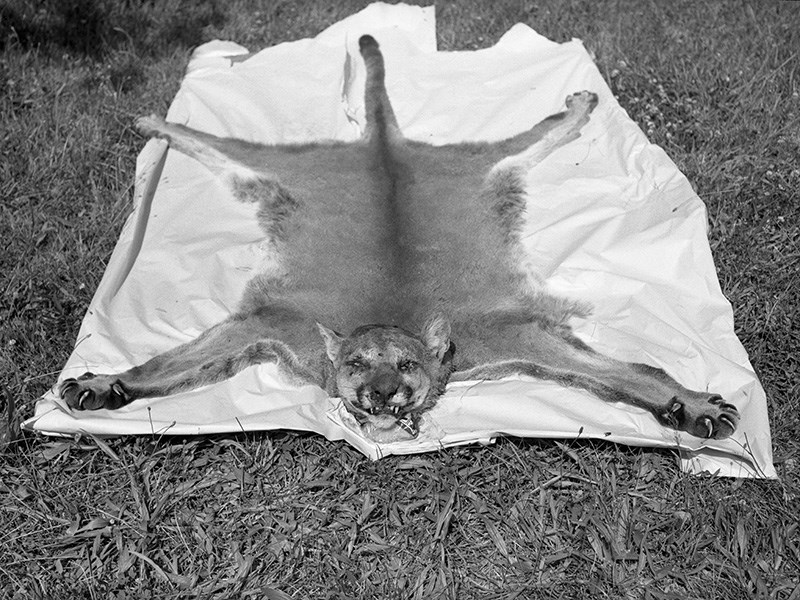Previous chapter [“The depression,” September 27]: A cougar had been targeting the Crowther family’s goats and chickens, livestock that was vital to the family’s survival during the bleak depression of the 1930s. One summer evening in 1939, the cougar returned. Young Nancy Crowther grabbed the family’s beat up, single shot .22 calibre rifle. She and her pack of dogs chased the cougar through the forest until they treed it. She tied her largest dog to a tree, steadied herself, and took aim for the cougar’s neck.
Nancy Crowther pulled the trigger. The cougar let out a ferocious screech, lept from the tree and disappeared into the bushes.
Nancy was on her feet, white-knuckling her now empty gun as she desperately strained to see through the thick salal where the cougar had disappeared. Her instinct was to run home, but the cougar hunter she had spoken to told her told her that any movement of flight could cause a cougar to attack, especially if you turned your back.
Her hound dog that was tied to the tree was going berserk, surging forward, until the frothing dog ripped the small tree right out from its roots. The dog chased after the cougar, dragging the small tree behind, and disappeared into the bushes.
All of Nancy’s little dogs followed. That was all Nancy needed to snap her into action; she loved her animals and couldn’t bear to lose another one to a cougar. She plunged into the bushes after her dogs.
Nancy was fully expecting to find at least one of her dogs being torn to pieces by the cougar, but she was shocked to find the giant cat lying prone on its side, surrounded by her frantic dogs.
Fearful the cougar was stunned and at any moment would leap up and attack, Nancy pushed past her dogs, swung the empty rifle around in her hands and started smacking the cougar on the head with its wooden stock. It was a chaotic scene.
On the third swing, the loose wooden stock broke from the gun. Nancy then used the barrel to hit the cougar until the barrel bent. The gun was ruined, but the cougar’s ribs still heaved with life.
In a state of panic and survival, Nancy Crowther searched the ground until she heaved up a large rock from the forest floor. With both hands, she brought the rock down mercilessly on the cougar’s head again and again until she was certain it was dead. Nancy Crowther had killed her first cougar with a rock.
Nancy collapsed beside the huge, tawny, motionless animal. A wave of depression swept over her. She knew that the beautiful cougar was only following its natural instincts when it went after her goats. She turned and looked at its huge front paws, the size of oven mitts.
The pelt was worth a bounty of $5, but the wild cat was too heavy to carry, so she spent an hour dragging it through the forest as night fell. While sweat poured down her face, her spirits began to lift. She thought of her goats, and the relief and pride her family would feel when she showed up with the massive dead cat.
When she finally emerged into the clearing of her family homestead, her parents and neighbours were gathered with lanterns, about to set off on a search for her. She had been gone for almost two hours. You can imagine their surprise when Nancy Crowther showed up dragging a full-grown cougar that measured seven feet from nose to tip of tail.
After her father and neighbour examined the cougar by the glow of their lanterns, they stood up in amazement. Nancy Crowther didn’t realize it in the woods, but the single rifle shot had struck the cougar in its vertebrae. It would have never fought back.
Later, her father and Nancy skinned the cougar and took the pelt into town for the bounty. Her father couldn’t help but tell anyone who would listen about the exploits of his daughter.
Soon, the Powell River News caught on to the story and on August 17, 1939, the paper printed the first of many, many articles on the wilderness adventures on Nancy Crowther:
The headline read:
Cougar Killed With .22 Shot By Girl…Rifle fires only one shell...Rock used to finish off...
The article continued below:
“Some women are afraid of a small mouse, but here is one young woman who is not afraid to tackle a full grown cougar. She is Miss Nancy Crowther, exceedingly quiet with a very low, soft voice. No one would suspect her of possessing such courage.”
The story goes on to share some of the details you just read.
Nancy Crowther became a local celebrity, even though she didn’t welcome it, nor did she really have much time to enjoy it. Just two weeks later, on September 1, 1939, the news crackled across the radio into the Okeover rainforest: Germany had invaded Poland, which would trigger World War II. The impact would also stretch all the way to the Crowther homestead, and would eventually cause Cougar Nancy to leave her wilderness home.
That’s in the next chapter of the Cougar Lady Chronicles.
Grant Lawrence is an award-winning author and a CBC personality who considers Powell River and Desolation Sound his second home. Portions of the Cougar Lady Chronicles originally appeared in Lawrence ’s book Adventures in Solitude and on CBC Radio. Anyone with stories or photos they would like to share of Nancy Crowther are welcome to email [email protected].



